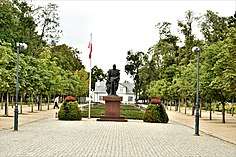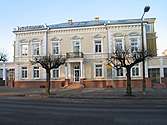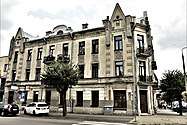Mława
Mława ([ˈmwava]; Yiddish: מלאווע Mlave) (German: Mielau) is a town in north-central Poland with 30,957 inhabitants in 2012. It is the capital of the Mława County.[1] The town is situated in the Masovian Voivodeship (since 1999), previously it was part of the Ciechanów Voivodeship (since 1975).
Mława | |
|---|---|
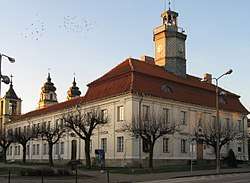 Mława ratusz | |
 Flag  Coat of arms | |
 Mława Location of Mława in Poland 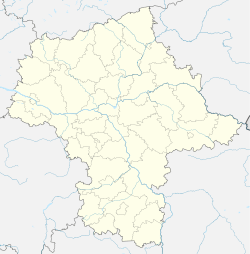 Mława Location of Mława in Masovian Voivodeship | |
| Coordinates: 53°07′N 20°22′E | |
| Country | |
| Voivodeship | |
| County | Mława County |
| Gmina | Mława (urban gmina) |
| Established | 15th century |
| Town rights | 1429 |
| Government | |
| • Mayor | Sławomir Kowalewski |
| Area | |
| • Total | 35.5 km2 (13.7 sq mi) |
| Highest elevation | 180 m (590 ft) |
| Lowest elevation | 135 m (443 ft) |
| Population (2012) | |
| • Total | 30,957 |
| • Density | 870/km2 (2,300/sq mi) |
| Time zone | UTC+1 (CET) |
| • Summer (DST) | UTC+2 (CEST) |
| Postal code | 06-500 to 06-501 |
| Area code(s) | +48 023 |
| Car plates | WML |
| Climate | Dfb |
| Website | www |
During the invasion of Poland in 1939, the battle of Mława was fought to the north of the city.
History
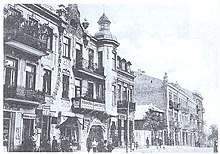
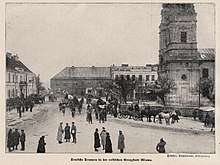
The first mention of Mława comes from July 2, 1426, when three princes of Mazovia - Siemowit V, Trojden II and Władysław I came here to a session of a local court. It is not known if Mława had already been an urban center, as there are no sources which would prove it. Three years later, Mława was incorporated as a town[2] It was a royal town, located in the Płock Voivodeship.[3] In 1521 during the Polish-Teutonic War, the town was captured and looted by the Teutonic Knights. In 1659 the town was burned by the Swedish troops, and in 1795, following the Partitions of Poland, Mława became part of the Kingdom of Prussia.
In 1807 it was included in the short-lived Polish Duchy of Warsaw. After Napoleonic Wars, in the 1815 Congress of Vienna Mława (along with the entire province) was incorporated into the Russian Partition of Poland, as part of the initially autonomous Congress Poland, where it remained until World War I. Since the town was located along the pre-1914 imperial Russian-German border, Mława was a place of heavy fighting between the two opposing armies. During the interbellum, the town was assigned to the Warsaw Voivodeship (1919–39). The government of the Second Polish Republic constructed several fortifications there due to proximity of the German border.[4][5]
_we_wrze%C5%9Bniu_1939.jpg)
In the opening stages of World War II, the advancing German army faced strong resistance from the Polish Army in the battle of Mława otherwise known as the Defence of the Mława between September 1 and September 3, 1939. The Einsatzgruppe V entered the town on September 10, 1939, and carried out first mass arrests among local Poles, who were afterwards imprisoned in the local prison.[6] Also on September 10, the Germans expelled 69 Jews from the town.[7] The Germans carried out mass searches of Polish offices, courthouses and organizations,[8] and mass arrests of local Polish intelligentsia, including local officials, teachers and priests, as part of the Intelligenzaktion, continued in the following months, many were afterwards murdered in the Soldau concentration camp.[9] Local disabled people were murdered in Ościsłowo, on February 20, 1940.[10] Shortly after the beginning of the occupation of Poland, Mława was annexed to Nazi Germany on 26 October 1939 and administered as part of Regierungsbezirk Zichenau.
The town (known as Mielau in German) gave its name to the Truppenübungsplatz "Mielau" military training range built by prisoners of the Soldau concentration camp nearby and nicknamed the New Berlin. The facility was used by the Nazis for repairing and refitting army tanks in Operation Barbarossa, and for testing anti-tank weapons and artillery on an area of 300 square kilometres (120 sq mi). Some fifteen villages around Krzywonoś were completely dismantled to make room for it and 25,000 people were expelled in the area.[11] Similar Nazi German military ranges in occupied Poland included the SS-Truppenübungsplatz Heidelager located in Pustków and the SS-Truppenübungsplatz Westpreußen located in Dziemiany.
Jews who had survived the ghetto were liquidated to Auschwitz. The last deportation was on December 10, 1942.
Prior to the arrival of the Soviets in 1945, Mława was the location of the German massacre of 364 prisoners of the forced labour camp adjacent to the Truppenübungsplatz "Mielau".[12]
In 1991, between 26–27 June, the town saw the a series of violent devastations and looting incidents when a group of youth estimated at 200 individuals, including young females, invaded the homes of the local Roma residents causing them to flee.[13] Not a single Roma person was injured in the riot,[13] but the material losses were substantial affecting up to 40% of residences.[13] Many perpetrators were arrested on-site; a number of them sentenced to jail after a trial.[13] The violence was described as motivated by racism and jealousy.[14][15] The incident that triggered the riot was the killing of a Polish pedestrian struck along with his companion in a hit-and-run by a Romani male driver.[13] The event triggered major discussions around the status of the Romani people in Poland, economic disparity, and the direction of the ongoing transitional political, social and economic reforms as the country adjusts after the end of the PRL era.
Sights
Among the historic sights of Mława are the Baroque town hall, Gothic-Baroque Revival Holy Trinity Church, the Józef Piłsudski Park, Baroque Saint Lawrence Church and many Art Nouveau townhouses
Industry
There is a large LG factory manufacturing TV sets and monitors located in the city. Mława was the first site of deployment for CONVAERO Polska's Bio-Dry™ technology project, where an annual throughput of 96,000 tonnes of MSW shredded is processed to achieve a 25% reduction in moisture and results in an easily separated and recycled end material [16]
Sport
Mława is home to Mławianka Mława, a men's football team, which played on the second tier in the 2004–2005 season.
International relations
Notable people
- Eva Kotchever - Polish feminist writer, was born in Mława
- Isaac Isaacs - Australian judge and politician who served as the 3rd Chief Justice of Australia and the 9th Governor-General, father born in Mława
- Joseph Opatoshu - Yiddish novelist and short story writer
- Barbara Rogowska - Polish comedian actress and comic
- Józef Skrobiński - Film director and painter
- Józef Unszlicht - Co-founder of the Cheka
See also
- Bolesław Prus' novel, Pharaoh, partly inspired by 19 August 1887 solar eclipse viewed at Mława
- Mława pogrom
- Vistula River Railroad
References
- "Wolfram|Alpha: City Data for Mlawa, Poland: demographics, maps". Wolframalpha.com. Archived from the original on 2013-02-09. Retrieved 2012-05-30.
- "Local history - Information about the town - Mława - Virtual Shtetl". Sztetl.org.pl. 1939-09-04. Archived from the original on 2013-10-29. Retrieved 2012-05-30.
- Adolf Pawiński, Mazowsze, Warszawa 1895, p. 37 (in Polish)
- Richard M. Watt, Bitter Glory: Poland and Its Fate, 1918–1939 Hippocrene Books, 1998. ISBN 0781806739.
- Witold Kaczynski, Pozycja Mława. Zarys historyczny.
- Maria Wardzyńska, Był rok 1939. Operacja niemieckiej policji bezpieczeństwa w Polsce. Intelligenzaktion, IPN, Warszawa, 2009, p. 112 (in Polish)
- Wardzyńska, p. 123
- Wardzyńska, p. 111
- Wardzyńska, p. 224, 228, 230-231
- Wardzyńska, p. 236
- Praca Zbiorowa (5 June 2012). "Nosarzewo Borowe : Truppenübungsplatz "Mielau"". Polska Niezwykła Mazowieckie (przewodnik) (in Polish). Wydawnictwo Demart publishing. Retrieved 1 August 2014.
- Janusz Dębski, Uroczystości na 68 rocznicę mordu na Kalkówce Archived 2014-08-14 at the Wayback Machine Mazowieckie Media, Kurier Mławski.pl 2013-01-17.
- Krzysztof Napierski (30 June 2011). "Mławski incydent dał nam doświadczenie na przyszłość" [The Mlawa incident gave us experience for the future] (reprint). Wywiad z Romanem Kwiatkowskim (Prezesem Stowarzyszenia Romów w Polsce) w "Głosie Mławy" (Interview with Roman Kwiatkowski, President of the Roma Society of Poland) for the "Voice of Mlawa" magazine. Stowarzyszenie Romow w Polsce (Roma Society of Poland, homepage). Retrieved 13 August 2014.
- "Poles Vent Their Economic Rage on Gypsies". The New York Times. July 25, 1991. Retrieved 26 January 2011.
- "Hooligans and the Neighbors' Cow". New York Times. July 29, 1991. Retrieved 26 January 2011.
- "Mlawa, Poland | The Power of Waste". Convaero. Archived from the original on 2012-05-17. Retrieved 2012-05-30.
External links
- Jewish Community in Mława on Virtual Shtetl
- Mława, Poland at JewishGen
- MKS Mlawa
| Wikimedia Commons has media related to Mława. |
